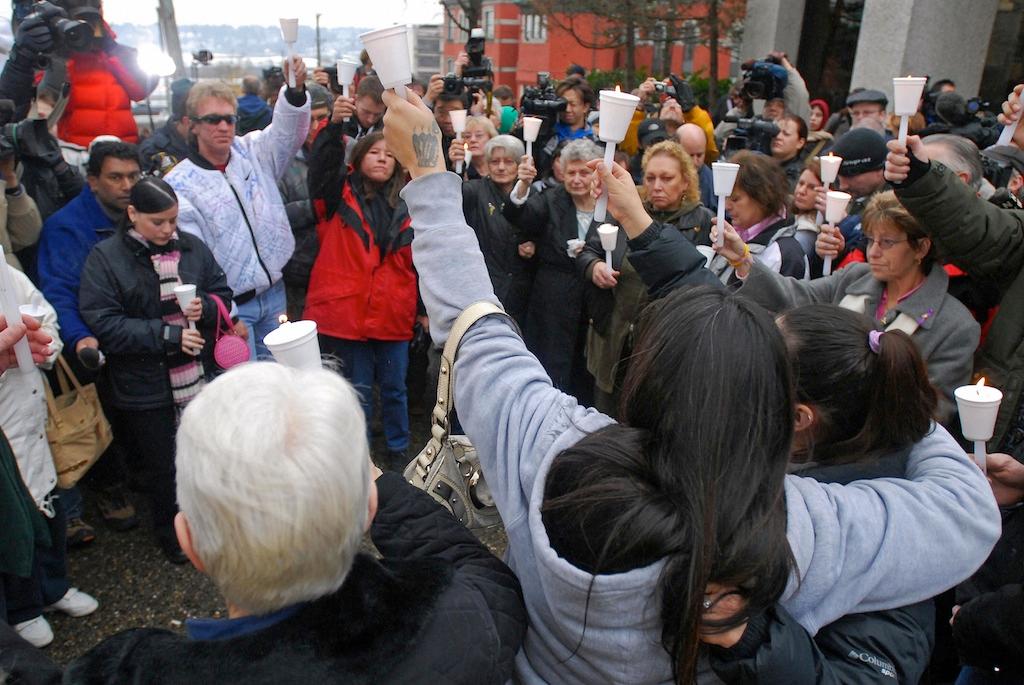Canada: missing women inquiry casts doubt on police work
Friends and family members of victims hold a vigil in New Westminster, British Columbia, Dec. 9, 2007, after a guilty verdict was announced for pig farmer Robert Pickton.
HAMILTON, Ontario — Thousands marched in cities across Canada earlier this month to remember missing and murdered women, just as new questions are arising over the police’s failure to catch one of the country’s most notorious serial killers.
The marchers, many of them family members of the victims, carried candles in vigils in Winnipeg, Edmonton, Ottawa and Vancouver to remember the missing — often women who lived on the margins of society.
Some of the killings happened decades ago but the families’ sorrow and anger still are raw.
“The outrage is with the police — mostly,” said Wayne Leng, a mechanic who zealously runs several blogs on the subject, including missingpersons.net.
The first memorial march took place 21 years ago in Vancouver’s Downtown Eastside neighborhood. Only a few blocks radius, the area hosts open drug markets and the dubious distinction of being Canada’s “poorest postal code.” This is where women — dozens of them — started going missing as far back as the late ‘70s.
Read more: Where are Canada's missing women?
Then in the ‘90s, a new cluster of missing cases provoked friends and families to gather in a Downtown Eastside park. Now vigils take place every Valentine’s Day.
For years the police proved incapable of stopping the killer, Robert Pickton, a pig farmer from British Columbia’s lower mainland.
Pickton was finally arrested in 2002 and convicted in 2007 of murdering six of the missing women from the Downtown Eastside in one of the most drawn-out and expensive murder trials in Canadian history. But he confessed to killing as many as 49.
Many Canadians have long held that the police turned a blind eye to the crimes because the women were mostly drug-addicts and worked as prostitutes.
“If six dogs from the neighborhood had disappeared, there would have been more done," Kathleen Hallmark-McClelland told a Vancouver Province newspaper reporter in 2002. Hallmark-McClelland’s daughter Helen disappeared in 1997.
Now, after years of dreary vigils and frigid prairie ceremonies, another drama has been unfolding almost daily in a Vancouver courtroom that drew fresh anger from those assembled at the memorials.
The Missing Women Commission of Inquiry got underway last October with a mandate to look into alleged inaction by police that enabled Pickton to kill with impunity for several years before his arrest.
More from Canada: Honor killings on trial
The high-profile inquiry was controversial even before it began.
Most of the organizations that seek standing at the commission withdrew in protest in the weeks leading up to the inquiry’s start. They were angry that the commission would not provide public funds for their participation, and because of a pervasive view among the groups that the inquiry would be weighted toward the government and police findings.
There were protests, too, over the appointment of Wally Oppal as commission chair. Oppal, years before, while he was top lawmaker in British Columbia, had said that such an inquiry was not necessary.
Oppal was also in the top law job when 20 of the 26 murder charges against Pickton were dropped.
The commission has made public startling revelations about the failure on the part of two police departments, the Royal Canadian Mounted Police (RCMP) and Vancouver Police, to stop the killer.
Some of the recent highlights from the inquiry include:
The lawyer representing a number of the families of Pickton’s victims in early February accused the commission of “enabling” a cover-up. Oppal shot back that there is “no evidence” of a cover-up.
The lawyer, Cameron Ward, also accused police and the commission of withholding reams of files considered crucial to the case. He claims the files would establish how investigators had a predator in their sights for years but failed to act in a mix of incompetence, indifference and jurisdictional wrangling between the RCMP and Vancouver Police.
More from Canada: Transgender Canadians barred from flights
The commission has heard how Pickton was brought to the attention of police investigators as a prime suspect as early as 1998.
Pickton encouraged investigators to search his farm in 2000 — police did not take him up on that offer. Years later, scores of DNA matches and articles of clothing and ID belonging to dozens of missing women, along with human remains, were found on Pickton’s property.
Police also dismissed key witnesses because of their criminal background.
Leng, the mechanic turned blogger, first became involved after reporting his friend Sarah de Vries missing from the Downtown Eastside in 1998. Though her DNA was found on Pickton’s farm, he was never tried over her disappearance or death.
Leng was anxious to be back in Vancouver and pass by de Vries’ last known address and attend the inquiry the week of the memorials. He said the families in attendance are quite discouraged, but feel their lawyers are doing the best they can.
“I don’t think the police did enough. They should have had Pickton a long time ago,” Leng said.
The Missing Women Commission of Inquiry continues this week and is expected to wrap up by the summer 2012. Some preliminary reports from the commission can be viewed here.
The World is an independent newsroom. We’re not funded by billionaires; instead, we rely on readers and listeners like you. As a listener, you’re a crucial part of our team and our global community. Your support is vital to running our nonprofit newsroom, and we can’t do this work without you. Will you support The World with a gift today? Donations made between now and Dec. 31 will be matched 1:1. Thanks for investing in our work!
